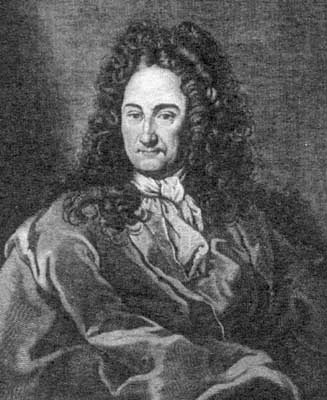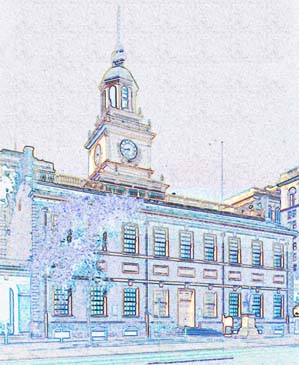|
Life, Liberty, and
The Pursuit of Happiness
How the Natural Law Concept of G.W. Leibniz
Inspired America's Founding Fathers
by Robert Trout

"The most perfect society is that whose purpose is the universal and supreme happiness."
(--Gottfried Wilhelm
Leibniz, 'On Natural Law,' c.1690)
"Happiness is the point where center all those duties which individuals and nations owe to themselves; and this is the
great end of the law of nature. The desire of happiness is the powerful spring that puts man in motion: felicity is the end
they all have in view, and it ought to be the grand object of the public will.|...To succeed in this, it is necessary to instruct
the people to seek felicity where it is to be found; that is, in their own perfection ...|.'"
"The first
general law that we discover in the very object of the society of nations, is that each individual nation is bound to contribute
every thing in her power to the happiness and perfection of all the others."
{--Emmerich de Vattel, ``The Law of
Nations,'' 1758}

"I am much obliged by the kind present you have made us of your edition of Vattel. It came to us in good season, when
the circumstances of a rising state make it necessary frequently to consult the Law of Nations. Accordingly, that copy which
I kept, has been continually in the hands of the members of our congress, now sitting."
{--Benjamin Franklin, letter
to Charles W.F. Dumas, December 1775}
"This [previous work on the law of nations], says a writer, is evidently
rather an introduction than a system; and it served only to excite a desire to see it continued with equal perspicuity and
elegance. The honor of this task was reserved for the great Vattel, whose work is entitled to the highest admiration!"
{--James Duane, Mayor and Chief Judge of New York City, August 1784}

Is human nature governed by the "law of the jungle," or the war of each against all, as Thomas Hobbes and Samuel
Huntington asserted. The founders of America were guided by a completely different conception of human nature. They recognized
that relations between men must be governed by a committment of men to promote the interests of each other for society to
survive and prosper.
Click here for excerpts from: Emmerich de Vattel's, The Law of Nations
While preparing a presentation on the economic policies of Alexander Hamilton for chapter meetings of the LaRouche movement,
I realized how badly Americans have been misled on their own nation's history. Most Americans, today, have no idea that there
once existed something, commonly known as the ``American System.'' The vast majority of Americans today think of freedom as
the equivalent of ``doing your own thing.'' Those who think of themselves as better educated are really no better off, believing
that the Constitution of the United States came out of the tradition of John Locke's Social Contract. Alexander Hamilton,
who had played a key role in shaping both the American economy and the Constitution of the United States, is commonly described
as a man whose outlook was ``aristocratic.''
The myth that the founding of American Republic was based on the philosophy
of John Locke could only have been maintained, because the history of Leibniz's influence was suppressed. The American Revolution
was, in fact, a battle {against} the philosophy of Locke and the English utilitarians. Key to this struggle, was the work
of the Eighteenth-century jurist, Emmerich de Vattel, whose widely read text, "The Law of Nations," guided the framing
of the United States as the world's first constitutional republic. Vattel had challenged the most basic axioms of the Venetian
party, which had taken over England before the time of the American Revolution, and it was from Vattel's {The Law of Nations,}
more than anywhere else, that America's founders learned the Leibnizian natural law, which became the basis for the American
System.
Virtually unknown today except amongst specialists, Emmerich de Vattel was born on April 25, 1714, in
the principality of Neufchatel, which was part of Switzerland. He became an ardent student of Leibniz, and in 1741, published
his first work, a defense of Leibniz, {Defense du systeme leibnitzien.} In another book analyzing the philosophy of Christian
Wolff, Vattel showed that Christian charity is consistent with natural law. He demonstrated that Christ's instruction, ``Love
your enemies,'' is proven by natural law. His most famous work, "The Law of Nations; or, Principles of the Law of Nature,
Applied to the Conduct and Affairs of Nations and Sovereigns," was published in 1758. He also published a piece on tragedy
and comedy, and a few poems.
In 1746, Vattel entered the diplomatic service of King Augustus III of Saxony, where
he was appointed the chief adviser of the government on foreign affairs in 1758. Vattel remained in this position until his
death in 1767.
Vattel's "The Law of Nations," was the most influential book on the law of nations for
125 years following its publication. The first English translation appeared in 1759. Numerous editions of {The Law of Nations}
were printed in England during the Eighteenth century, which were widely read in the American Colonies, along with editions
in the original French.
The majority of this essay will be devoted to reviewing the contents of Vattel's "The
Law of Nations," and its documented impact on America's founding fathers. But, we must first review certain fundamental
issues of law and the nation-state, as these were considered by G.W. Leibniz, and as they have been further developed by Lyndon
H. LaRouche, Jr.
Locke vs. Leibniz: Two Completely Contrary Conceptions of Human Nature
Vattel: Natural Law Based on Human Nature as Creative Reason
A summary of The Law of Nations
The Law of Nations and the Declaration of Independece
The Law of Nations and the U.S. Constitution
The influence of Vattel on Alexander Hamilton
|

